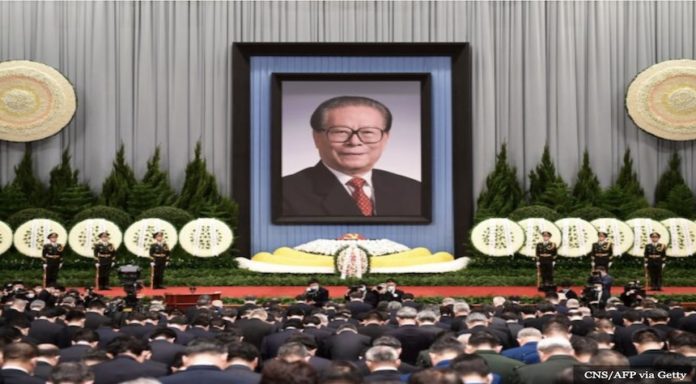Hu was last seen in public in mid-October when he has dragged out of the prestigious Communist Party Congress while sitting less than a foot from Xi. He then attended a smaller Jiang service at a military medical hospital.
CCTV, the Chinese state broadcaster, made note of Hu’s attendance at Monday’s event. According to the South China Morning Post, Hu didn’t attend the larger state funeral due to his advanced age.
Despite Hu’s unceremonious departure from the Party Congress, his absence raised suspicion. Every five years, the Communist Party holds its Congress to elect its president, Party chairman, as well as the members of its top governing body, the Politburo. The Congress has been transformed into a coronation ceremony under Xi. Xi has no rival for the top spot and has used his position as a way to fill the Politburo’s void with loyal aides.
Hu vanished from the public eye when cameras captured him being dragged from Congress just before Xi was elected to another term as leader. Hu was apparently sifting through papers when two young men approached him and pulled him out. Hu seemed to look to Xi who was seated beside him and silently plead for help, but Xi mostly ignored his pleas. He was able to see that one Communist Party official moved to assist the elderly man. However, his colleague pulled him back and urged him to not get involved.
Hu was not seen in public since then. The bizarre spectacle was not covered by the Chinese government. The Xinhua News Agency (a state media organization) claimed that Hu was “not feeling well” and that he “insisted” on attending the event despite his declining health. Xinhua stated that Hu is now much healthier after his ouster.
Hu returned to Beijing on Monday, at an event that was attended by only top Communist Party officials. This took place before Jiang’s body had been cremated. A group of male Party officials clad in sanitary masks stood before Jiang’s shrine and offered a goodbye greeting. Hu seemed to be in need of someone to assist him as he stood and walked to the shrine.
The state-run CCTV highlighted that “Hu Jintao also went into the hospital to pay his last respects to Jiang.”
Hu didn’t appear for Tuesday’s official funeral. According to South China Morning Post, an anonymous source claimed Hu’s health was the main reason. Top Party officials had to stand for the whole ceremony. The source claimed that Hu and other communist elders who were absent “couldn’t stand for that long given their age.”
Many officials and VIPs were not present at the ceremony, but Jiang’s wife Wang Yeping (94 years old) was. The Morning Post identified Hu and at least two other Party senior officials who were not present at the state funeral but attended the smaller ceremony on Monday. They were 94-year-old former officials and 105 years old.
Jiang was president from 1993 to 2003. He succeeded Hu. In his 90s, Jiang made a name for himself by being disrespectful to Xi at the 2017 Communist Party Congress. During Xi’s three-hour speech at the Congress that year Jiang yawned and checked his watch. He also read aloud to himself and undermined the prestige of that occasion. Younger Chinese fans called Jiang “the toad” and Xi’s regime didn’t drag Jiang out by his elbows nor appear to punish him.
The regime did not censor any comments made on Weibo (the state-controlled social media platform in China) that were celebrating Jiang or laughing at him.
Jiang and Hu had a turbulent relationship. Hu is remembered for being a low-profile Chinese president who did little to exercise his power and is frequently accused of allowing corruption in the Party to flourish. Many blame Jiang for Hu’s lack of power. He continued to pull strings behind closed doors to keep power at his disposal and limit Hu’s ability to run the country. Jiang didn’t seem to similarly handicap Xi Jinping who was elected in 2013.
Xi expressed his gratitude to Jiang during Tuesday’s public funeral. He had crushed China’s pro-democracy movement violently and eliminated any dissent after the 1989 Tiananmen Square massacre. Although Jiang was Shanghai’s mayor at the time of the massacre, his main task as president was to restore China’s image and eliminate any remaining dissident movements.
Jiang did not express any regret for the massacre in Beijing in 2011, and stated emphatically, “We don’t believe there was any tragedy at Tiananmen Square.” It was actually a counterrevolutionary rebellion that sought to oppose the Communist Party leadership and overthrow the socialist system.
“In the 1980s and 1990s, there were serious political storms at home and abroad.” “World socialism was faced with severe complications.” Xi recalled that China was subject to so-called sanctions’ from the West in Tuesday’s address.
“Comrade Jiang supported and implemented the decision of the Party Central Committee to take a clear position against the turmoil in 1989,” continued the dictator. “The decision to protect the fundamental interests of the people depends on the vast majority of party members, cadres, and the masses to effectively ensure Shanghai’s stability,” Jiang, who was 96, died last week from leukemia.










